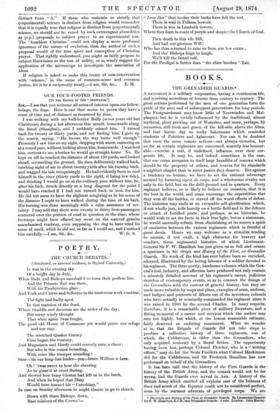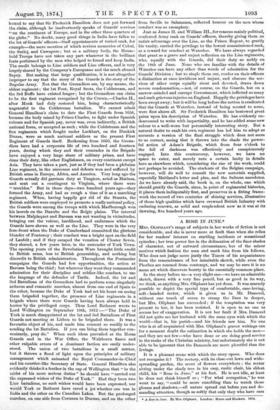BOOKS.
THE' GRENADTER GUARDS.*
A REGIMENT 18 a military corporation, having a continuous life, and receiving accretions of honour from century to century. The great actions performed by the men of one generation form the pride of the next and of subsequent generations for long periods. The Footgnardsman may know little of Neerwinden and Mal- plaquet, but he is vividly influenced by the traditional, almost mythical, glory growing out of Waterloo, and more, perhaps, by memories, still fresh and green, of the hill-side above the Alma, and that heroic day on rocky Inkermann which reminded students of Poictiers and Agincourt. Nor can it be doubted that even the more remote actions—not always victories, but so- far as certain regiments are concerned, scarcely less honour- able—exercise a real, if undefined, influence over their cor- porate life. It may be, and indeed sometimes is the case, that one corps arrogates to itself large breadths of renown which should be the property of others, and weaves for its standards a mightier chaplet than in strict justice they deserve. But against a tendency so human, we have to set the national advantage secured by fostering esprit de corps, and a wholesome rivalry not only in the field, but on the drill-ground andin quarters. Every regiment believes, or is likely to believe on occasion, that it is the best in the world, and some encourage the superstition that they won all the battles, or staved off the worst effects of defeat. The historian may smile at an excusable self-glorification which, if not wholly just, tells heavily on a battle-field and in the defence or attack of fortified posts ; and perhaps,' as an historian, he would wish to set the facts in their true light, but as a statesman, he would assuredly refrain from diminishing at its source a spirit of emulation between the various regiments which is fruitful of great deeds. Hence we may welcome as a stimulus tending Lo sustain, if not exalt, a high character for bravery and conduct, those, regimental histories, of which Lieutenant- General Sir F. W. Hamilton has just given us so full and ornate a specimen in his Origin and History of the First, or Grenadier Guards. No work of the kind has ever before been so enriched, adorned, illustrated by the loving labours of a soldier devoted to his regiment. The three portly, handsome volumes which the Gen- era's zeal, industry, and affection have produced not only contain a minutely detailed account of his regiment's career, judicious sketches of contemporary events, so as to connect the doings of the Grenadiers with the current of general history, but they are made more valuable by maps and plans, examples of arms, uniform, and badges, and portraits of fifteen out of the seventeen colonels who have actually or nominally commanded the regiment since it was raised in 1660 by the second Charles. In many respects, therefore, it is a remarkable piece of military literature, and a fitting memorial of a career and services which the author may rate too highly, but which, at the lowest reasonable estimate, fairly deserved an enduring monument. What we wonder at is, that the Brigade of Guards did not take steps to produce a collective history of three regiments, one of which, the Coldstream, is older than the Grenadiers, who only acquired seniority by a Royal fiction. The opportunity having been lost, perhaps Colonel Fletcher, who is a "writing officer," may do for the Scots Fusiliers what Colonel Mackinnon did for the Coldstream, and Sir Frederick Hamilton has now performed on behalf of the Grenadiers.
It has been said that the history of the First Guards is the I history of the British Army, and the remark would not be far wrong, had the Guards ever served in Asia. A history of the British Army which omitted all exploits east of the Isthmus of Suez and south of the Equator could not be considered perfect, even by the warmest advocate of privileged corps: We are
• The Origin and History a/ the First, or Grenadier Guard:. By Lieutenant-General Sir F. W. Banailon, !C.O.D., late Grenadier Cluarde. 8 vols. London; John Murray.
bound to say that Sir Frederick Hamilton does not put forward the claim, although he inadvertently speaks of Guards services
on the continent of Europe, and in the other three quarters of the globe."- No doubt, many good things in India have fallen to the lot of Guards' officers—Staff appointments of varied rank, for example—the mere mention of which revives memories of Cabul, the Sutlej, and Cawnpore ; but as a military body, the House- hold Troops have not taken any part whatever in the brilliant feats performed by the men who helped to found and keep India. The credit belongs to Line soldiers and Line officers, and is very largely shared by the Company's Europeans and the much abused Sepoy. But making that large qualification, it is not altogether improper to say that the story of the Guards is the story of the Regular Army. Not that the Grenacliers are, by any means, the oldest regiment ; the 1st Foot, Royal Scots, the Coldstream, and the 3rd Buffs have existed longer ; but the Grenadiers can claim to be the first regiment recognised by the Crown,—Charles after Monk had duly restored him, being characteristically ungrateful to the Coldstream battalion. We cannot admit General Hamilton's claim to date the First Guards from 1656, because the body raised by Prince Charles, to fight under Spanish colours and for Spanish pay, never was, even indirectly, a British national force, or accepted as such ; while the Coldstream and the fine regiments which fought under Lockhart, on the Dunkirk Dunes, were as much national soldiers as the present First Regiment of Guards itself. Reckoning from 1660, the Grena- diers have had a corporate life of two hundred and fourteen years, during which they and their comrades in the Brigade have enjoyed a very large share of military prizes, and have done their duty, like other Englishmen, on every continent except Asia. They have taken a part, just as if they had been a plebeian Line regiment, in the successes and defeats won and suffered by British arms in Europe, Africa, and America. Very long ago the Guards actually did garrison duty at Tangiers, acted as Marines, and sent out a contingent to Virginia, where there were "troubles." But in those days—two hundred years ago—they formed the Army, and had as rough a time of it as a marching regiment. When, having happily got rid of the Stuarts, the British soldiers were employed to promote a really national policy, the Guards were among the troops with which Marlborough won his laurels on the Danube and the Belgic plains. The interval between Malplaquet and Barossa was not wanting in vicissitudes, bringing out the valour, hardihood, and endurance which the Guards have shown as well as the Line. They were in the very fore-front when the Duke of Cumberland committed the glorious blunder of Fontenoy ; their conduct was a bright spot on the field of Laufelt ; and if they escaped the vexation of Closter Seven, they shared, a few years later, in the surrender of York Town. The opening years of the Revolution Wars brought little credit to British arms, less to British generalship, and nothing but discredit to British administration. Throughout the Peninsular campaigns the Guards had few opportunities, the action at Barossa being the chief; but wherever they went they commanded admiration for their discipline and soldier-like conduct, to use the language of the defender of Tarifa. Indeed, the 1st and 3rd Battalions of the Grenadiers had to perform some singularly arduous and romantic marches, almost from one end of Spain to the other, because the Duke of York had set his heart on seeing them brigaded together, the presence of Line regiments in a brigade where there were Guards having been always held in horror by the privileged corps. Thus Lord Bathurst wrote to Lord Wellington on September 10th, 1812 :—" The Duke of York is much disappointed at the 1st and 3rd Battalions of First Guards not meeting at Lisbon to be brigaded there. It was a favourite object of his, and made him consent so readily to the sending the 1st Battalion. If you can hring them together con- veniently, pray do." When such ideas prevailed at the Horse Guards and in the War Office, the Walcheren fiasco and other culpable errors of a dominant faction are easily under- stood. The union of two battalions is a small Matter, but it throws a flood of light upon the principles of military management which animated the Royal Commander-in-Chief and his courtier-like Secretary of State. General Hamilton also evidently thinks it a feather in the cap of Welli gton that "in the midst of his more serious duties" he should have "carried out the expressed wishes of the Duke of York." Had they been two Line battalions, no such wishes would have been expressed, nor would York or Bathurst have cared a jot whether one was in India and the other on the Canadian Lakes. But the prolonged marches, on one side from Corunna to Duenas, and on the other
from Seville to Salamanca, reflected honour on the men whose conduct was so exemplary.
Just as James II. and William TIL, for reasons mainly political, conferred Army rank on Guards' officers, thereby giving them an. unfair advantage over the Line, so the Prince Regent, to gratify his vanity, carried the privilege to the lowest commissioned rank, as a reward for conduct at Waterloo. We have always regarded that grant as a grave and unjust reflection on the Line regiments, who, equally with the Guards, did their duty so nobly on the 18th of June. None who are familiar with the details of Waterloo can have any other than words of admiration for the Guards' Division; but to single them out, confer on their officers a distinction at once invidious and unjust, and obscure the ser- vices of other corps equally stout and devoted, draws down severe condemnation,—not, of course; on the Guards, but on a narrow-minded and corrupt Government, which inflicted so many and such grievous injuries on England. Happily the privileges have been swept away; but it will be long before the notion is eradicated that the Guards at Waterloo, instead of being second to none, were first above all. Sir Frederick Hamilton has bestowed great pains upon his description of Waterloo. He has evidently en- deavoured to write with impartiality, and he has added some new colour to a well-worn but perennially interesting story. But a natural desire to exalt his own regiment has led him to adopt as accurate a version of the final struggle which does not seem to us correct, seeing that it throws into the shade the power- ful action of Adam's Brigade, which from four o'clock to the fall of darkness was effectively and conspicuously engaged. Into this controversy, however, we have no space to enter, and merely note a certain laxity in details here as elsewhere which, considering the size of the work, could not perhaps be avoided. The students of the Belgian campaign, however, will do well to consult the new materials supplied, especially Maitland's letter and plan, and the Saltoun anecdotes. As we have already said, the book is, on the whole, one which should gratify the Guards, since, in point of regimental histories, it places theth indisputably first, and preserves in a fitting frame- work the record of two centuries of shining services, illustrative of those high qualities which have crowned British Infantry with enduring renown, as solid and resplendent now 'as it was at its dawning, five hundred years ago.































 Previous page
Previous page